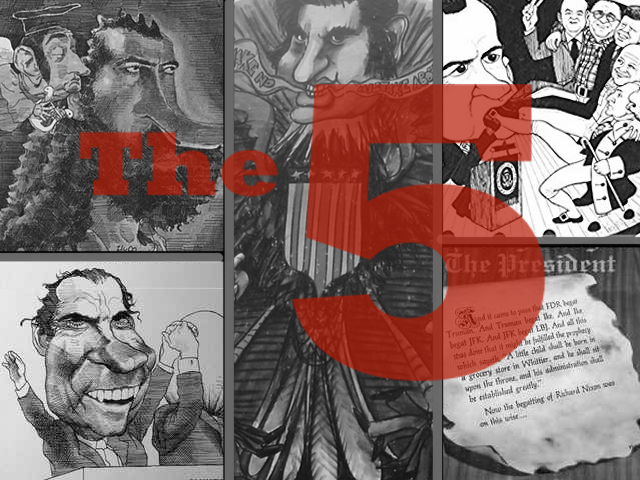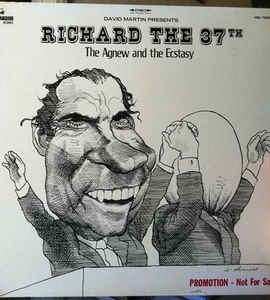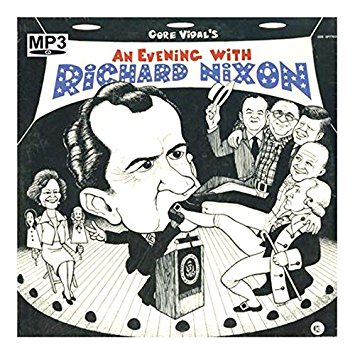The Five: Five Albums That Tried to Destroy Richard Nixon


Jason Klamm is a filmmaker, author, actor and podcaster. He directed one of the world’s first viral videos, has written two books, and is working on his third, based on The Comedy on Vinyl podcast. Throughout 2017, Jason is listening to a comedy album a day, and talking about each one at bit.ly/comedyalbumaday. His comedy work has placed in national screenwriting competitions and his short films have been distributed by NBC Universal, Comedy Central and Frontier Airlines. He has also written films and TV pilots for Jamie Kennedy Entertainment. Jason just celebrated six years of his groundbreaking podcast, Comedy On Vinyl, and has started a brand-new daily video series for 2017 entitled #ComedyAlbumADay, in which he’s dedicated himself to listening to the best and worst of his 500+ record collection, one album per day.
For the last six years, I’ve run the Comedy on Vinyl podcast, where myself and a guest (usually a comedian) talk about the great and less great comedy albums of all time. For all of 2017, I’ve been listening to a comedy album a day and, right after the inauguration, I felt myself compelled to listen to my Nixon LPs. I have a number of these, stemming more from my obsession with the Vice Presidency for the last decade, but they served a strong purpose. I’ve also been running my own satirical presidential campaign since I was 24, which I turned into a mockumentary feature film, Looking Forward, in 2008, as well as its sequel, coming out this year. I’m obsessed with the power of satire not to necessarily topple regimes, but to enable people to think they can.
I picked five of the Nixon albums from my collection that, while they don’t exemplify any particular comedic tack any more than the others – some being a bit more rough around the edges than the more slick productions – do add up to a sum total of positive influence. This might be the one of those rare times when bad comedy doesn’t dilute the good – the worst of them just keep the best of them afloat.
Richard the 37th: The Agnew and the Ecstasy (1969) – by David Martin
David Martin has the honor of the first full-length comedy album treatment of Nixon, which opens with Nixon asking his daughter to call him “Mister President.” The double-talk begins immediately and rarely lets up, Martin’s characterization at one point saying “Belief has been the cornerstone of our belief.” Musical interludes are the highlight, here, with a song about Nixon’s foot-in-mouth Vice-President, Spiro Agnew, entitled “Only a Heartbeat Away,” featuring the immortal line; “We’re going to help the blacks, the Negroes and the Afro-Americans. We must give them better housing, better education, better job opportunities. For only with our help, will they ever know their place.”

.
I Am the President (1969) – by David Frye
David Frye was an impressionist who launched his career proper with his Richard Nixon impression. He asks his bathroom mirror “Who’s the President of them all?” and speaks to the dumbest version of Spiro I’ve ever heard. At one point, he asks Nixon to “tell [him] about the rabbits.” This album takes place as Nixon is moving into the White House and navigating the world of politics, reassuring himself and everyone else by saying “I am the President.” His bumbling narcissistic interpretation of Nixon would continue in his other albums, giving his the most power when some of the material fell flat. Although, this does feature an exchange in which Nixon says he believes in facts, and a reporter tells him that he “hasn’t said a word,” to which Nixon replies “That is also a fact.” Not hard-hitting, it might seem, but Nixon’s double-speak was almost an art, and this was new.
.
Orson Welles: The Begatting of the President (1969) – by Orson Welles
This biblical re-telling of the political and social conditions that somehow led to the presidency of Nixon started as a book. The only way to make it work was to get the greatest voice on the planet. Enter: Orson Welles. He adds gravitas and great comedic timing to an interesting early-synth soundtrack. Welles does some accent work too, adding Southern inflection to his LBJ here and there, and reads a mountain of words that would otherwise seem to dull fairly quickly. Instead, when he calls Nixon a “low-potential high achiever,” and as Eisenhower reminds Nixon that “Kings are not always wise, sometimes they’re just there,” it’s quite poignant. The fact that there is no live audience here, unlike the fare of Frye and Martin, really sells it. It would seem campy with an audience. One of the biggest stretches in it actually gets me pretty good: “You will not have Nixon to smite around anymore.”
.
Richard Nixon: Superstar (1971) – by David Frye
I originally assumed this might be a musical parody, but Frye sticks to his guns with an album introduced by a pointlessly effeminate portrayal of Billy Graham. Otherwise, there are great moments on this album, with some writing credited to Gabe Kaplan of Welcome Back, Kotter. When referring to a freeze on prices and on wages, Frye’s Nixon reassures the audience that this “also affects your president. My income will be frozen at two-hundred-thousand dollars.” When questioned on Vietnam, he explains that he’s “Giving the Vietnamese control over their own destiny. If not in this life, then in the next.” Gabe Kaplan’s stamp on this album might be best as Jerry Rubin, at the time, a young revolutionary who would eventually come to symbolize the “selling-out” of some hippies. This album saw all of that coming, when Kaplan’s Rubin, when asked by Frye’s Nixon if he’d rather live somewhere else, responds “This country’s good for revolutionaries. College tours, book royalties. I’m making a fortune!”
.
Gore Vidal’s An Evening with Richard Nixon (1972) – by Gore Vidal
Gore Vidal once called a friend and myself “better interviewers than Ken Burns,” with his typical wry, self-appreciating wit. This album is introduced by a Vidal analog and a William Buckley analog, both of which are spot-on, to the point that listening to the not-Vidal reminds you that he had a sense of humor, but wasn’t a comedy writer. Not to say this album isn’t funny, but Vidal’s point was deeper – every word spoken by Nixon in the play on which the album is based is from the public record. Somehow, that remains fascinating, especially with a panel of judges in the form of Washington, Kennedy and Eisenhower, the men Vidal uses to examine the life of Nixon. Another point of interest, to nerds like myself, is that this album also features a young Susan Sarandon.

These are not the only Nixon or Spiro albums. There were so many I haven’t yet heard them all. David Frye made three of them – another in 1971, then in 1973, and even in 1996.
No one could make the argument that these albums were directly responsible for destroying Nixon. In January, 1972, Professor Henry F. Graff was quoted as saying “No president has ever been laughed out of office.” That very same month, G. Gordon Liddy was making plans for an event that would be Nixon’s undoing and his legacy, comic and otherwise – the Watergate break-in. Truly, hubris brought him down, along with a mountain of evidence, and the comedians had already sounded the alarm.
The point is persistence. These albums kept being made. The comedians assisted in bringing public opinion to a new place – distrust of government. Sure, this existed in some form already, but with Nixon, it soon became the default position. Distrust in power and oversight, such as it was, became important when people were faced with inevitable truths, both in stark fact and in satire. Satire played the role of pissing you off while also taking the edge off – ironically, the edgier the comedy, the better. Anything that made you laugh at the situation while also not letting you forget was not only welcome, it was necessary.
The hammer of satire persisted against the wonky nails of corrupt government. One man releasing five albums of satire on the same President might seem like a cynical money grab, but if Frye had wanted that, he could also have pandered to the people who liked Nixon and made light, fun fair, a la The First Family, to which his albums were frequently compared, misguided as that comparison might have been.
This is the most interesting part of it – in terms of comedy albums, we’d never seen anything quite like this, much as we might think we had. The First Family was barely satire, and mostly silly. That series of two albums died in the charts the same day John F. Kennedy died in the streets of Dallas. The goal of the Nixon albums was exactly the reverse, if less carnal – Nixon satirists were out for political assassination, using the President’s own words and ego as weapons against him.
Comedy on Vinyl is a weekly podcast wherein today’s great comedy minds talk about the great comedy albums of all time. Guests like Harry Shearer, Rachel Bloom and Scott Aukerman talk about legends like Mel Brooks, Bob Newhart and Lily Tomlin. The podcast is also home to the oral history of Firesign Theatre, as told by Phil Proctor, which has a video component on the show’s YouTube channel.
Website: http://comedyonvinyl.com
Twitter and Instagram: @comedyonvinyl
Read more comedy news, stories, interviews with comedians, videos and comedy clips on our home page. Get more comedy news. Watch more viral videos. Read more interviews with the best comics in the business.
.
Latest posts by Jason Klamm (see all)
- The Five: Five Albums That Tried to Destroy Richard Nixon - April 21, 2017
